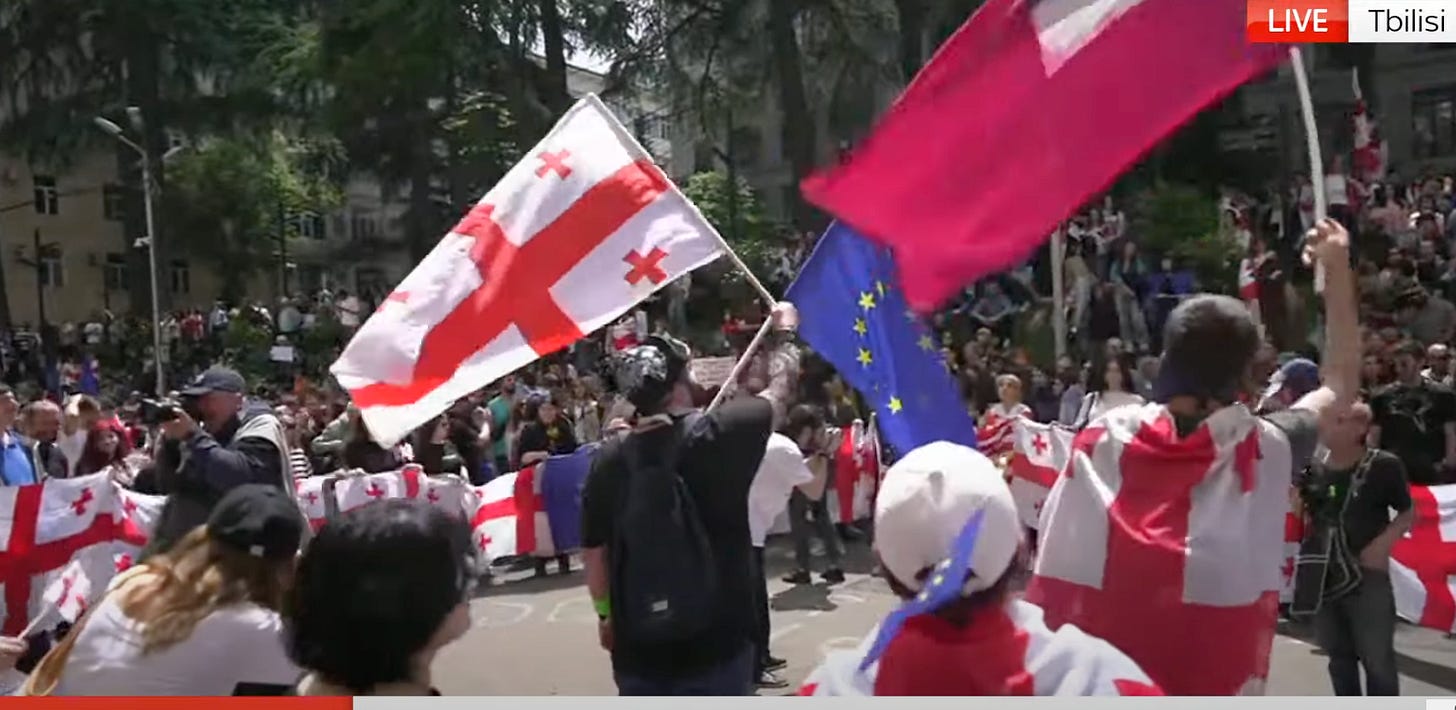Why Georgia's Foreign Agents Law Undermines Democracy and Human Rights
Trouble in Tbilisi
Protests are raging in the streets of Tbilisi today.
The Parliament of the Republic of Georgia has just overridden the veto of the country’s pro-Europe (and pro-democracy) president, who sought to block a law that would force many NGOs to register as “foreign agents.” The law is modeled on similar measures in Russia that led to the near wholesale criminalization of pro-democracy and human rights civil society groups. Georgians fear the same fate now awaits their nascent democracy.
This move in Georgia's parliament is being pushed through by a political party led by an oligarch who made his fortune in Putin's Russia. It is also happening at the same time as Georgia is seeking to establish closer ties with the West and join the European Union.
On the line to discuss what this law actually says, how it may impact Georgia's future, and human rights inside Georgia is Denis Krivosheev, Deputy Director for Europe & Central Asia at Amnesty International.
Our full conversation is freely available across all podcast listening platforms. The full transcript is available immediately below the fold for our paying subscribers.
Mark Leon Goldberg: To kick off, can I have you explain what this foreign agent law says?
Denis Krivosheev: The law is commonly known as Foreign Agent Law, and that’s because it’s modeled on the Russian Foreign Agent Law, but it’s titled slightly differently in Georgia. It’s called “Law on Transparency of Foreign Influence.” And the title is quite cunning. But, essentially, any independent organization which receives more than 20% of its budget from foreign sources will have to register itself under this label and use it publicly. Failing to do so will result in severe penalties. So, many NGOs have already said they will not comply with the law and use this label because it’s designed to undermine their credibility. It’s a smearing attempt by the government, and the NGOs are not prepared to follow it.
Mark Leon Goldberg: Are there specific NGOs that this law is going to be targeting? When the people who wrote this law were crafting it, did they have an idea in mind of the kinds of NGOs that they were seeking to label with this kind of moniker?
Denis Krivosheev: I believe there will be some NGOs that the authors of this legislation have in mind. Now, it doesn’t obviously specify them, and it will, in theory, be targeting everyone equally. But the problem for the Georgian authorities at the moment are those independent NGOs, which do rely on foreign funding and which are the government’s vocal critics. And there are quite a few. They work on human rights, they work on a number of issues. They are a problem for the government, and this is the way to deal with them.
Mark Leon Goldberg: So, this law is the project of the Georgia Dream Party, which is led by Bidzina Ivanishvili. Who is he, and how did he become such a force in Georgian politics?
Denis Krivosheev: Bidzina Ivanishvili is a Georgian businessman, an oligarch who has made a fortune through his businesses. Some of these are linked to Russia. That’s where quite a lot of speculation is: what is his motivation? It’s clearly understood by everyone in Georgia that he is the mastermind of quite a lot of what’s happening, but his nominal title is “Honorary Chairman of Georgia Dream.” And, of course, publicly, there are other people at the head of the party, but he’s that all-influential figure who seems to be taking quite a lot of decisions.
Mark Leon Goldberg: Yeah, and he seems just like a very interesting character. I’ve been to Tbilisi. He has this just like massive compound overlooking Tbilisi that kind of gives off vibes like that of a Bond villain. And he has exotic animals roaming his property and apparently even a pool full of sharks. But he does seem to be the one pulling the strings behind the scenes even though he is nominally only the honorary chairman of this party.
Denis Krivosheev: That seems to be the case. That’s common assumption. I have no reasons to doubt it, but it’s not a human rights issue as such. So, as Amnesty International won’t comment on this. But it’s important to understand what’s happening and why, and who are the key actors — he’s certainly a very central figure to quite a lot that’s happening.
Mark Leon Goldberg: So, in the weeks leading up to the passage of this law, there were really big protests in Tbilisi against the law. How would you characterize the protests, and who was out there on the streets, and what was the government’s response?




